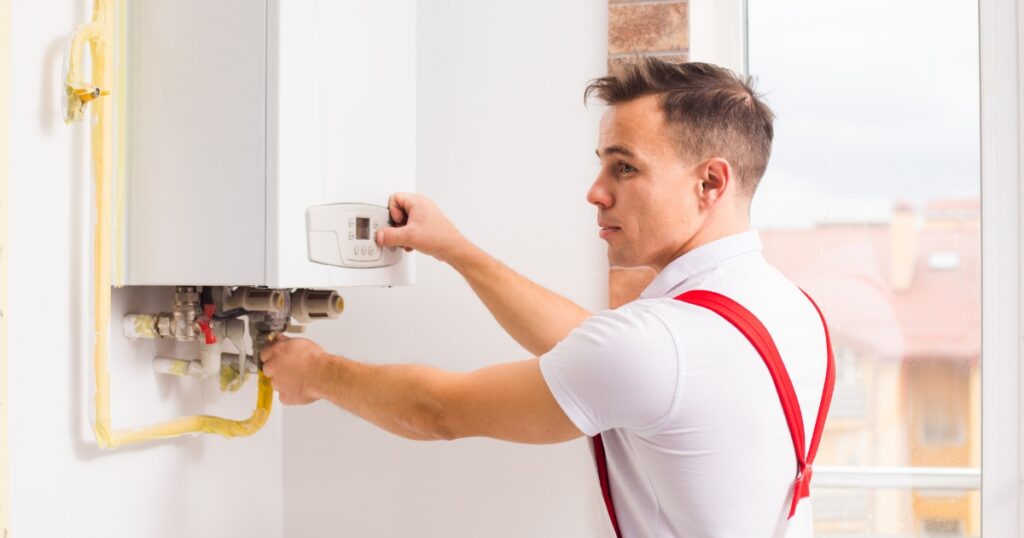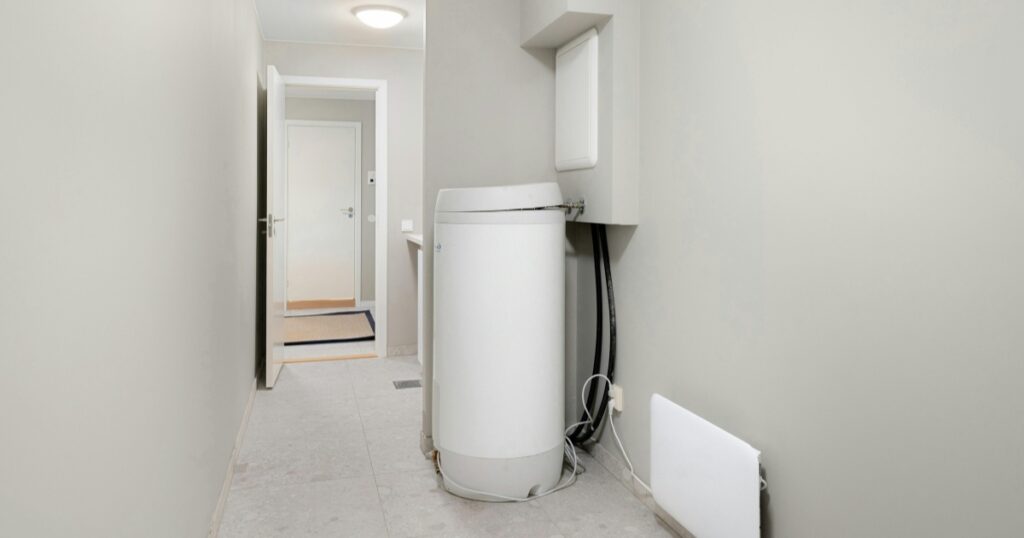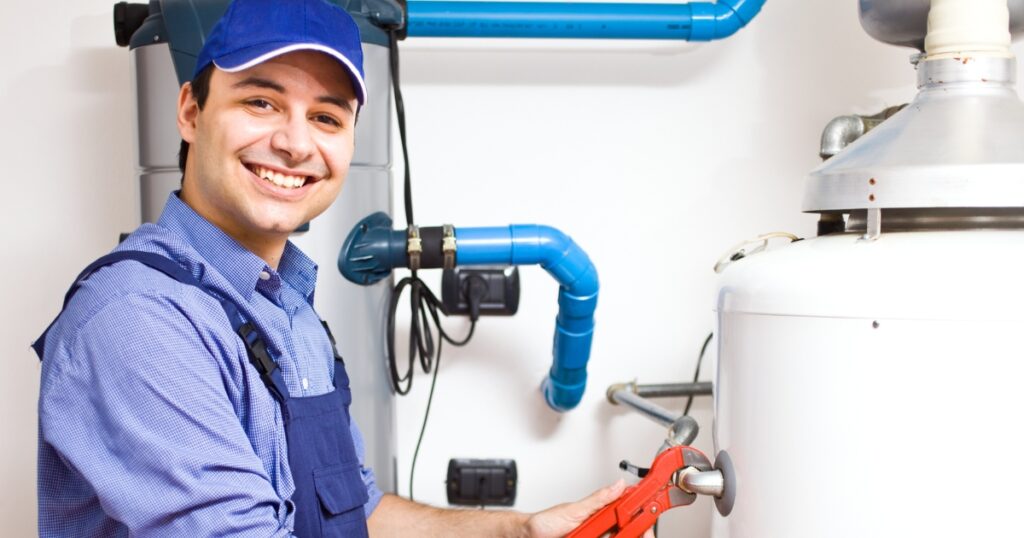As the cool change rolls in and we start feeling the bite of those brisk mornings, you can bet your bottom dollar our hot water systems are putting in the hard yards to keep up. We know all too well what it’s like to face a shivery shower as Jack Frost is nipping at our noses – not a good time! That’s exactly why we’ve thrown ourselves into figuring out the best seasonal maintenance tips.
Our guide’s chock-a-block with handy hints that’ll ensure your system isn’t chucking a wobbly when you’re hanging out for that warm embrace on a chilly morn. So go on then, have a squizz at these top-notch pointers and stay cosy – you won’t regret giving it a burl!
Key Takeaways
- Keeping your hot water system in check with regular maintenance saves cash and keeps the heat flowing when you need it most, especially during those frosty winter months.
- Cracks, leaks, or a dodgy relief valve can spell trouble for your hot water system; giving them a once-over before winter sets in is a smart play to avoid a world of cold showers.
- Flushing out sediment from the tank and keeping an eye on the anode rod helps fend off corrosion and keep things running smoothly as silk, so don’t skip these steps.
- If your unit’s making weird noises like it’s auditioning for a ghost flick or spitting out rusty water, start thinking about sending it off to that big scrapyard in the sky and getting a fresh one.
- Don’t just wing it – book an annual check-up with a legit plumber to give your hot water system the thumbs up for another year of trusty service.

Importance of Regular Hot Water System Maintenance
Moving on from the basics, let’s focus on why keeping your hot water system in top shape is crucial. Regular maintenance ensures that our water heaters run efficiently and safely throughout the year.
Small steps like draining the heater to clear out sediment build-up or checking the anode rod for corrosion greatly extend the unit’s lifespan. This not only saves us money by avoiding costly repairs but also ensures we always have access to hot water when we need it.
Keeping tabs on seasonal changes can prevent unexpected breakdowns during times when we rely heavily on our heating systems. We schedule annual servicing with a plumber to make sure everything is working as it should be before winter hits.
This proactive approach helps us steer clear of emergency situations and gives us peace of mind knowing that our homes will remain cosy even during those chilly months. Regular checks are key components of responsible home ownership—they keep energy costs down and ensure our hot water systems serve us well for years to come.
Hot Water System Maintenance for Winter
During winter, it’s important to check for cracks and leaks in your hot water system, turn off the system when away on holidays, inspect the relief valve, be cautious with gardening work around the unit, and get yearly professional maintenance.
These steps will ensure your hot water system runs efficiently throughout the colder months.
Check for cracks and leaks
Inspect the hot water system for any visible cracks or leaks. Look closely at the tank, pipes, and connections for signs of damage or water seepage. Any crack or leak can lead to inefficiencies in the system and potential water damage in your home.
Addressing these issues promptly can prevent costly repairs and ensure your hot water system operates efficiently throughout the winter months.
Regularly checking for cracks and leaks is crucial as it helps to identify any potential problems early on before they escalate into significant issues. Inspecting for cracks and leaks is an important part of maintaining your hot water system’s functionality, preventing energy wastage, and avoiding potential property damage due to a malfunctioning unit.
Turn off the system when away
Once you have checked for cracks and leaks in your hot water system, it is important to remember to turn off the system when away. This simple step can help prevent potential accidents and reduce energy consumption while you are not at home.
By turning off the hot water system when away, you can also minimise the risk of any unexpected malfunctions or leaks occurring in your absence. Taking this precaution can contribute to maintaining the efficiency and safety of your hot water unit.
To avoid unnecessary energy costs and potential issues, we should all make it a habit to turn off our hot water systems when leaving our homes for an extended period. By doing so, we not only save on electricity or gas but also reduce wear and tear on our systems during periods of non-use.
Inspect the relief valve
Inspecting the relief valve is crucial for ensuring the safety and functionality of your hot water system. A faulty relief valve can lead to a buildup of pressure, which may result in leaks or even a potential explosion.
By regularly inspecting and testing the relief valve, you can verify that it opens properly when needed to release excess pressure. This simple yet important task helps to safeguard your hot water system from potential damage and ensures its continued efficient operation during the colder months.
After inspecting the relief valve, it’s vital to be cautious with gardening work around your hot water system. Ensuring proper maintenance now will help avoid any unexpected issues later on.
Be cautious with gardening work
When undertaking gardening work, it’s important to be cautious around your hot water system to avoid causing unintentional damage. To prevent any accidental harm, be mindful of where the hot water system is located in relation to your garden activities.
It’s crucial to ensure that no heavy equipment or tools come into contact with the unit and its components. This small step can significantly contribute to maintaining the integrity and efficiency of your hot water system.
Moving forward from ensuring caution during gardening tasks, let’s explore signs indicating when a hot water system may need replacing.
Get yearly professional maintenance
To ensure the optimal performance and longevity of your hot water system, it’s crucial to schedule a yearly professional maintenance check. Here’s what a licensed plumber or certified professional will typically cover during an annual inspection:
- Testing the pressure relief valve to ensure it functions properly and releases excess pressure.
- Flushing the tank to remove sediment buildup and improve efficiency.
- Checking and replacing the anode rod to prevent corrosion and extend the water heater’s lifespan.
- Inspect the condenser and evaporator coils for any signs of damage or blockages.
- Cleaning air filters to maintain efficient airflow and heating distribution.
Signs Your Hot Water System Needs Replacing
If your hot water system is emitting strange noises such as popping or rumbling, this could be a sign that it’s time for a replacement. Additionally, if you notice rusty or discoloured water coming from the taps, this could indicate internal corrosion within the system and may suggest it needs to be replaced.
A significant drop in the temperature of your hot water or frequent fluctuations in water temperature can also signal that your hot water system is reaching the end of its lifespan.

Furthermore, if you find puddles of water around the base of your hot water system, there might be a leakage issue indicating that it’s time for a new unit. Similarly, an increase in energy bills without any change in usage patterns can also point towards an inefficient and ageing hot water system that requires replacing.
These signs should not be ignored as they can lead to further damage and potential safety hazards.

Tips for DIY Hot Water System Maintenance
Regularly draining the heater, conducting visual checks, inspecting the anode rod, and scheduling yearly licensed plumber inspections are essential for maintaining your hot water system.
Make sure to click on the link below to read more about these tips and keep your hot water system in top condition throughout the winter months.
Drain the heater regularly
Regularly draining the water heater is essential to maintain its efficiency and prolong its lifespan. Draining the heater once or twice a year helps in cleaning its inner parts and removing sediment build-up, ensuring optimal performance.
By flushing out the tank regularly, you can prevent potential issues caused by sediment accumulation, keeping your hot water system functioning at its best.
To continue caring for your hot water system, let’s explore “Visual checks” for identifying any early signs of trouble.
Visual checks
After draining the water heater regularly, it’s important to conduct visual checks to ensure everything is in good condition. Look for any signs of leaks or corrosion on the tank and connections.
Check the relief valve for any leaks or dripping, and visually inspect the anode rod for signs of wear and tear. Additionally, examine the temperature and pressure gauges to ensure they are functioning correctly.
Regular visual inspections can help identify potential issues early on, allowing for timely repairs and preventing more significant problems down the line.
Inspecting your hot water system regularly helps maintain its efficiency and extends its lifespan. By keeping an eye out for leaks, corrosion, and other visible indicators of wear and tear, you can address any issues promptly before they escalate into costly repairs or replacements.
Check the anode rod
Checking the anode rod is essential for preventing corrosion and prolonging the life of your hot water system. The anode rod sacrifices itself to protect the inner lining of the tank from rust, so it’s crucial to inspect it annually and replace it if necessary.
Regularly checking this component can help you avoid costly repairs and extend the lifespan of your hot water system.
Schedule yearly licensed plumber inspections
To ensure the continued efficient performance of your hot water system, it is essential to arrange for professional inspections by licensed plumbers on an annual basis. These experts can provide thorough evaluations of your hot water unit, ensuring that potential issues are identified and resolved before they escalate. Here are important factors to consider during the yearly licensed plumber inspection:
- Assess the overall condition of the hot water system, including pipes, valves, and connections, to identify any signs of wear or damage.
- Test the pressure relief valve to verify its proper function in releasing excess pressure within the system and preventing potential hazards.
- Inspect the anode rod to check for corrosion or deterioration and determine if it needs replacement to protect the inner lining of the tank from rusting.
- Evaluate the efficiency and performance of the hot water unit to ascertain its ability to meet your household’s needs effectively.
- Recommend any necessary adjustments or upgrades based on changes in regulations or advancements in technology to enhance the efficiency and safety of your hot water system.
Swift Hot Water Solutions Tailored to Your Space!
In conclusion, maintaining your hot water system is crucial for its efficiency and longevity. Regular DIY checks such as draining the heater, visual inspections, and checking the anode rod can help prevent potential breakdowns.
Additionally, scheduling yearly professional maintenance with a licensed plumber is essential to ensure optimal performance of your hot water system throughout the year. Taking these steps will not only save you from costly repairs but also keep your hot water system running smoothly during seasonal changes.
Prepare your hot water system for the changing seasons with expert tips from Hot Water Repairs Today! Our seasonal maintenance guide is your go-to resource for keeping your system running smoothly year-round. From winterising your heater to summer tune-ups, we’ll help you ensure optimal performance and efficiency. Don’t wait until problems arise – take proactive steps to extend the lifespan of your hot water system. Contact us today to access our seasonal maintenance tips and keep your hot water flowing reliably every season!






